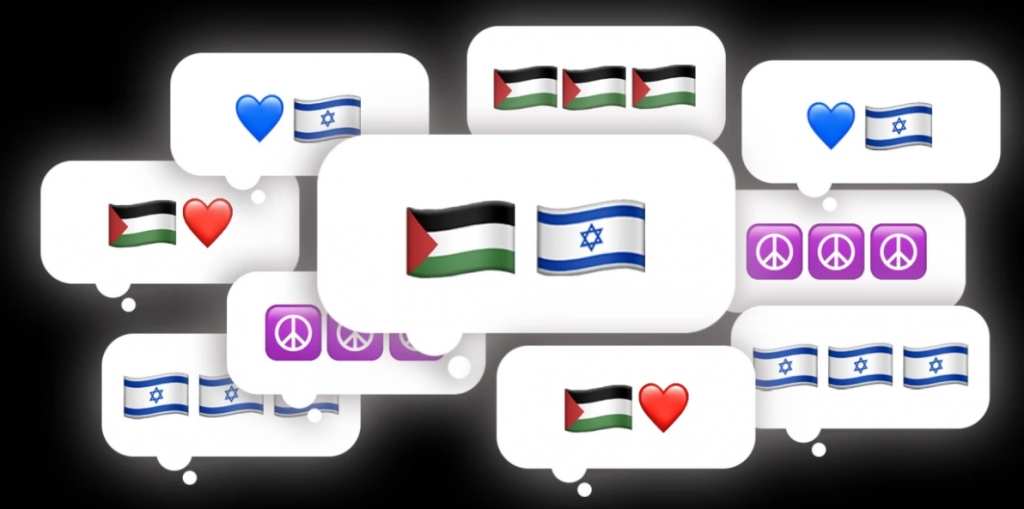By Myra Mulongoti, Arts & Entertainment Editor
On Jan. 11, during a trial at the International Court of Justice (ICJ), South Africa accused Israel of genocide against Palestinians in Gaza, citing actions following the Oct. 7 Hamas Attack. Israel denied these claims and presented their defense to the court. The ICJ is the top court in the United Nations (UN). Notably, during court proceedings, South African lawyer Tembeka Ngcukaitobi presented social media videos made by Israel Defense Forces (IDF) soldiers as evidence of Israel’s alleged genocidal intent in Gaza. This trial illustrates the significant role social media is playing in both shaping perceptions and narratives surrounding the Israel-Palestine crisis while simultaneously influencing matters in more direct ways.
Students at Post shared their perspectives on this matter and discussed their personal engagement with social media platforms through this crisis. Senior education major Mariela Canales shared her thoughts on her perception of the role of social media in shaping public opinion on the crisis.
“I believe social media has become a useful platform for raising awareness,” Canales said. “I think [social media] has made engaging with and understanding events in the region more interactive; it holds a space for more people to engage with things more actively and gives them the drive to take initiative and take action.”
Graduate special education major Raya Saab highlighted the transformative role of social media in raising global awareness about the situation in Gaza. As a Palestinian-American, Saab emphasized how social media was a catalyst in amplifying discussions and fostering widespread interest in the conflict. She expressed her belief that without social media, the issue would not have garnered as much attention, citing past trends of ignorance and indifference.
“Social media is the only thing that made the situation in Gaza so worldwide and so talked about and so relevant,” Saab said. “As a Palestinian, growing up, no one ever knew what I was talking about, no one knew anything about Palestine. I’m 23, so I’ve been dealing with it my whole life and this is the first time, at least in my lifetime, that it’s become so apparent and it’s become so worldwide that everyone knows about it.”
Both interviewees shed light on why they believe social media has become such a powerful force in shaping perceptions and inciting action; they both highlighted social media’s ability to provide real-time, immersive experiences that generate a sense of immediacy and personal connection to the events.
Canales reflected on the immediacy of information dissemination in the digital age.
“It’s interesting that we now have the ability to watch everything happen in real time…This makes people more emotionally invested in things…this emotional reaction incentivizes them to want to act,” they said.
Saab echoed this sentiment, emphasizing the emotional impact of social media content.
“On social media, it’s like we’re watching live what these people are going through,” she said. “It feels like you’re there with them. So for people that have no connection to Palestine, no connection to Israel, and had no knowledge on [the issue] to be getting that visual, to be seeing that on their feed, it makes it important. And I think that’s why so many people are so passionate about the topic right now, because it consumes you.”

Notably, Canales and Saab both mentioned Motaz Azaiza and Bisan Owda as accounts they follow on social media to keep up with the matter. Azaiza is a 24-year-old Palestinian journalist who uses his Instagram to share photos that shed light on life in the Gaza Strip. He has 19 million followers on Instagram. Owda was a filmmaker in Gaza prior to the Oct. 7 Hamas attack on Israel; she now uses her Instagram account to provide real-time updates on life in Gaza. She has 4 million followers on Instagram.
Saab discussed how she selects the accounts she interacts with on social media, noting the importance of seeking out multiple perspectives.
“I like to follow people that are actually there because you can’t fabricate that,” she shared. “It’s live footage. You can’t deny that. And then it’s good to follow some in America too, because they’re American so they have different perspectives on the news.”
On the other hand, as a Palestinian-American with family ties to Palestine, Saab has a personal connection to the events unfolding in the region and she shed light on the emotional toll of constantly engaging with social media content related to the conflict. She described the struggle of balancing the need to stay informed with the need to protect her mental and emotional well-being.
“There was a point where I had to lessen the amount of time I spent on social media just because obviously for me, it’s very personal,” Saab shared. “I have family there…seeing those images and videos really negatively affected my mental health…Even now, after like 30 minutes, I have to put my phone away because it’s too much…We’ve become desensitized to it. But it’s not normal to constantly see those types of images. So I’m still on it to keep up but I have to put it away sometimes.”
Despite limited coverage of the ICJ trial on mainstream Western traditional news outlets, such as BBC and CNN, proceedings were accessible via livestreams hosted by users on social media platforms such as X (formerly Twitter) and YouTube. Canales shared her thoughts on social media being used as a tool to bypass traditional news sources.
“It’s clear for me that white institutions in power push a lot of pro-Israel propaganda and I think it’s great that social media is being used to bring attention to alternative perspectives and shed light on the injustices happening in the world,” Canales said.
According to its official website, the Boycott, Divestment and Sanctions (BDS) movement is a “Palestinian-led movement for freedom, justice and equality. BDS upholds the simple principle that Palestinians are entitled to the same rights as the rest of humanity.” Companies considered by BDS to be “engaged in violations of Palestinian human rights” have faced social-media driven boycotts in support of the movement. Canales discussed the role social media played in her decision to take action in the matter through boycotting.
“For me personally, social media played a role in me taking action by boycotting companies that support Israel like McDonalds and Starbucks,” Canales shared. “I first heard about this on social media, but I also always take the extra step to research things on my own and form my own opinions and make my own decisions.”
The narratives shared by Canales and Saab offer insights into the complex role social media is playing in the Gaza crisis. Social media has reshaped global perception and engagement with the matter. The ICJ issued an emergency ruling on Jan. 26. South Africa’s main request was for the court to order Israel to immediately suspend its military operations in and against Gaza. The court did not grant this but did order Israel to “take all measures within its power to prevent and punish the direct and public incitement to commit genocide in relation to members of the Palestinian group in the Gaza Strip,” read official court documents.



Be First to Comment